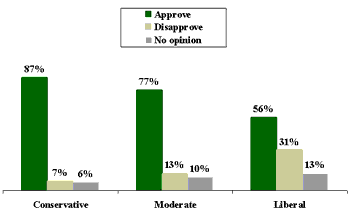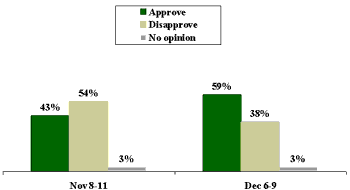GALLUP NEWS SERVICE
PRINCETON, NJ -- One result of the terrorist attacks of Sept. 11 has been the American public's rally behind its government officials. In the days following the attacks, approval ratings for the president and Congress reached record highs, and general trust in government achieved levels not seen since the 1960s. Three months following the attack, that overwhelming support is still evident. The latest Gallup poll shows very high approval of various government leaders' handling of the war on terrorism -- virtually unchanged from last month. This is even the case for Attorney General John Ashcroft, who has been criticized by some for advocating military tribunals and for other actions he has taken.
The poll, conducted Dec. 6-9, shows 87% of Americans approve of the way President Bush is handling the war on terrorism, very similar to his overall job approval rating of 86%. Bush's rating is little changed from a month ago, when 89% approved of the way he was handling the war.
The public also rates Secretary of Defense Donald Rumsfeld highly, giving him an 82% approval rating for his handling of the war effort. Last month, 80% approved of Rumsfeld. Homeland Security Director Tom Ridge's performance is rated favorably by 67% of Americans, up seven points from last month. This is due mainly to the fact that more Americans today have an opinion about the job Ridge has done -- still, 21% say they have no opinion of Ridge.
Ashcroft Rated Positively Despite Controversy
While few administration officials have been criticized publicly for their actions since Sept. 11, some have questioned steps taken by Attorney General John Ashcroft. Immediately following the attacks, the Justice Department detained several hundred men believed to have had ties to terrorists. Ashcroft did not release the names of the detainees, nor the reason for their detention, for several weeks following the arrests. Additionally, the Bush administration announced that those suspected of terrorism could be tried in military tribunals, which would be conducted in secret, would not require a unanimous vote for conviction, and whose decisions could not be appealed.
Despite these controversial actions, Americans rate Ashcroft's handling of the war on terrorism very positively. Seventy-six percent say they approve and only 14% disapprove, similar to last month when 77% approved and 10% disapproved. These figures are in keeping with findings from a Nov. 29-30 Newsweek poll that showed a majority of the public either approved of, or was willing to accept, the government's use of military tribunals and the indefinite detention of legal immigrants suspected of crimes.
Disapproval of Ashcroft is highest, at 31%, among self-described liberals, but even among this group a majority, 56%, say they approve of the job the Attorney General is doing.
| Opinion of Attorney General John Ashcroft's Handling of the War on Terrorism |
 |
| Dec 6-9, 2001 |
News Media Approval Ratings Improving
In the Nov. 8-11 Gallup poll, only the news media received a negative evaluation from the public for its handling of the war on terrorism. At that time, 43% approved while 54% disapproved. The latest poll shows the public's assessment of the media has greatly improved since then, as now 59% approve and 38% disapprove. Perhaps this change is due to the reduced focus on anthrax in the news, which dominated the headlines for much of late October and early November. At that time, 60% of Americans thought the media were overreacting to the threat of anthrax, according to the Oct. 19-21 Gallup poll. In past weeks, the focus of media coverage of the war on terrorism has shifted more to the continuing military effort in Afghanistan and the hunt for suspected terrorist mastermind Osama bin Laden.
| Opinion of the Media's Handling of the War on Terrorism |
 |
The public also gives the American people in general high ratings for how they have handled the war. Ninety percent approve and only 8% disapprove of how Americans are handling the war on terrorism.
Survey Methods
These results are based on telephone interviews with a randomly selected national sample of 1,002 adults, 18 years and older, conducted Dec. 6-9, 2001. For results based on this sample, one can say with 95 percent confidence that the maximum error attributable to sampling and other random effects is plus or minus 3 percentage points. In addition to sampling error, question wording and practical difficulties in conducting surveys can introduce error or bias into the findings of public opinion polls.
Do you approve or disapprove of the way the following people are handling the war on terrorism since Sept. 11? How about -- [RANDOM ORDER]?
A. George W. Bush
|
Approve |
Disapprove |
No opinion |
||
|
2001 Dec 6-9 |
87% |
10 |
3 |
|
|
2001 Nov 8-11 ^ |
89% |
8 |
3 |
|
|
^ |
Based on half sample. |
|||
B. Defense Secretary Donald Rumsfeld
|
Approve |
Disapprove |
No opinion |
||
|
2001 Dec 6-9 |
82% |
9 |
9 |
|
|
2001 Nov 8-11 ^ |
80% |
8 |
12 |
|
|
^ |
Based on half sample. |
|||
C. Attorney General John Ashcroft
|
Approve |
Disapprove |
No opinion |
||
|
2001 Dec 6-9 |
76% |
14 |
10 |
|
|
2001 Nov 8-11 ^ |
77% |
10 |
13 |
|
|
^ |
Based on half sample. |
|||
D. Homeland Security Director Tom Ridge
|
Approve |
Disapprove |
No opinion |
||
|
2001 Dec 6-9 |
67% |
12 |
21 |
|
|
2001 Nov 8-11 ^ |
60% |
14 |
26 |
|
|
^ |
Based on half sample. |
|||
E. The news media
|
Approve |
Disapprove |
No opinion |
||
|
2001 Dec 6-9 |
59% |
38 |
3 |
|
|
2001 Nov 8-11 ^ |
43% |
54 |
3 |
|
|
^ |
Based on half sample. |
|||
F. The American people
|
Approve |
Disapprove |
No opinion |
|
|
2001 Dec 6-9 |
90% |
8 |
2 |
